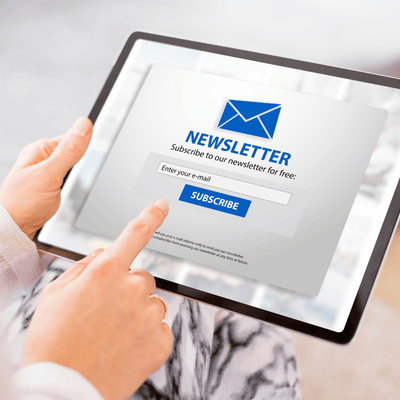Email marketing remains one of the most powerful tools for businesses of all sizes. With an average return on investment (ROI) of $42 for every dollar spent, it’s hard to ignore the impact that well-executed email marketing can have on engagement, loyalty, and revenue. In this guide, we’ll walk you through the essentials, from building your email list to crafting emails that convert. Get ready to turn your email marketing strategy into a revenue-generating machine.
1. Why Email Marketing Matters for Your Business
Statistics & ROI
Email marketing is an incredible investment with a proven track record. Consider these statistics:
- For every dollar spent, email marketing generates an average return of $42 (Financial Post).
- 61% of customers prefer to be contacted by brands via email (Statista).
- Emails are 40 times more effective at acquiring new customers than social media (McKinsey & Co).
Building Stronger Relationships
Emails provide a direct line to your audience. Unlike social media, where algorithms can limit your reach, emails land right in your subscribers’ inboxes. They offer a unique way to stay top-of-mind and keep customers informed about new products, services, or valuable content.
Retention & Loyalty
Email marketing strengthens customer loyalty. When you offer personalized content and exclusive offers, customers are more likely to stick around and continue engaging with your brand.
Segmentation & Personalization Potential
Email marketing allows for segmentation, targeting different audience groups based on behavior, location, or demographics. Personalized emails are proven to deliver 6x higher transaction rates.
2. Building Your Email List: Best Practices
Creating a Value Proposition
To grow your list, offer something valuable in return for a subscriber’s email. This could be exclusive content, discounts, or a free resource. Make it clear that by signing up, they’re gaining something worthwhile.
Lead Magnets That Work
Popular lead magnets include downloadable guides, discount codes, and valuable content that is relevant to your audience. If you’re in the fitness industry, offer a free workout guide. For e-commerce, a discount code on the first purchase works wonders.
Using Signup Forms Effectively
Place signup forms strategically on your website: consider the homepage, footer, and a dedicated landing page. Ensure forms are optimized for mobile, as over 50% of users access email on mobile devices.
Compliance & Permissions
Be transparent about what subscribers are signing up for, and ensure you have their permission. Not only is this a legal requirement, but it also protects your brand from spam complaints and ensures your emails reach the intended audience.
3. Crafting Compelling Emails That Convert
Subject Line Strategies
Your subject line is the first thing subscribers see, so make it count! Aim for clear, concise, and intriguing subject lines that spark curiosity. Experiment with questions, humor, or numbers, like “5 Tips for a Better Morning” or “Unlock Your Exclusive Discount Inside.”
The Power of Personalization
Personalization goes beyond adding a first name. Use segmentation to send tailored content to different audience groups. For example, send a different email to new customers than you would to repeat buyers.
Designing for Engagement
Ensure your emails are visually appealing and easy to read on mobile devices. Keep the layout clean, use engaging images, and include clear CTAs that stand out. Make sure your CTA is clear and specific, such as “Shop Now,” “Get Your Guide,” or “Sign Up Today.”
Writing Copy That Resonates
Your email copy should align with your brand’s voice. Use a conversational tone to make readers feel like they’re talking to a friend, and be concise. Highlight the benefits of taking action, and keep the message focused.
4. Types of Emails to Include in Your Strategy
Welcome Series
First impressions matter. Use welcome emails to introduce your brand, set expectations, and build excitement. Include a discount code, a quick brand story, or a roundup of your most popular content.
Newsletters

A well-curated newsletter keeps your audience informed and engaged. Share valuable insights, highlight new blog posts, or announce upcoming events. Keep the format consistent so subscribers know what to expect.
Promotional Emails
Seasonal campaigns, flash sales, and product announcements drive conversions. Create a sense of urgency by using phrases like “limited-time offer” or “only a few left.”
Educational Content
Establish your brand as an authority by sending valuable educational content. This could be guides, how-tos, or industry tips. When subscribers gain value from your emails, they’re more likely to stay engaged.
Customer Reactivation Emails
If a subscriber hasn’t engaged in a while, send a reactivation email. Remind them of what they’re missing, offer an incentive, or ask for feedback on how you can improve.
5. Segmenting Your Audience for Better Results
Basic Segmentation
Start with basic segments based on age, location, or purchase history. This lets you target groups with relevant content, increasing open and conversion rates.
Behavior-Based Segmentation
Behavioral data, such as browsing history or past purchases, allows you to send targeted messages based on actions. For example, if someone abandoned their cart, send a reminder with a discount.
Dynamic Content
Dynamic content adapts to the subscriber, changing based on variables like location or past interactions. This level of personalization can greatly improve engagement.
6. Measuring Success: Key Metrics to Track
Open Rate
The open rate shows how many people opened your email. If it’s low, try tweaking your subject lines or experimenting with send times.
Click-Through Rate (CTR)
CTR measures how many people clicked on your CTA. This metric reveals how effective your email content and CTA placement are.
Conversion Rate
The conversion rate tracks how many people completed a desired action, like making a purchase. It’s one of the most direct indicators of your email’s effectiveness.
Bounce Rate & Unsubscribes
A high bounce rate could indicate list quality issues. Unsubscribes help you gauge if your content is relevant to your audience.
ROI Calculation
To calculate ROI, subtract the cost of your campaign from the revenue generated, then divide by the campaign cost. This metric shows the profitability of your efforts.
7. Advanced Strategies for Growing and Nurturing Your List
A/B Testing
Testing elements like subject lines, design, and send times helps you understand what resonates with your audience. Run A/B tests regularly to optimize your strategy.
Automated Drip Campaigns
Set up automated workflows to nurture leads. For example, if a user signs up for a free guide, trigger a series of emails offering additional value and promoting your services.
Re-engagement Campaigns
If subscribers have gone inactive, send a re-engagement campaign. Offer a discount, ask for feedback, or highlight what’s new with your brand.
Using Behavioral Triggers
Trigger emails based on customer actions. For example, send a follow-up email if a user views a product multiple times without purchasing.
8. Avoiding Common Mistakes in Email Marketing
Overloading Subscribers with Emails
Sending too many emails can lead to unsubscribes. Respect your audience’s time by finding a balance that keeps them engaged without overwhelming them.
Poor Design Choices
Emails that aren’t mobile-optimized or have too much text can deter readers. Keep designs simple, make CTAs easy to click, and ensure images load quickly.
Neglecting the Unsubscribe Option
While it might seem counterintuitive, providing a clear unsubscribe option is essential for compliance and maintaining list health. Users who want to leave are less likely to mark your email as spam.
Ignoring Compliance
Regulations like GDPR and CAN-SPAM ensure that your email practices are ethical and compliant. Familiarize yourself with these guidelines to avoid fines and protect your brand’s reputation.
Craft Emails That Drive Results
Email marketing offers an unmatched opportunity to connect with your audience, increase loyalty, and drive sales. By building a quality list, crafting compelling messages, and tracking key metrics, you can create an email marketing strategy that yields exceptional results. Ready to take your email marketing to the next level? Reach out to Rep Lock Marketing for a free consultation and let us help you craft emails that convert.
Keep Reading: Blogging for Business: How to Go From Unknown to Unforgettable





